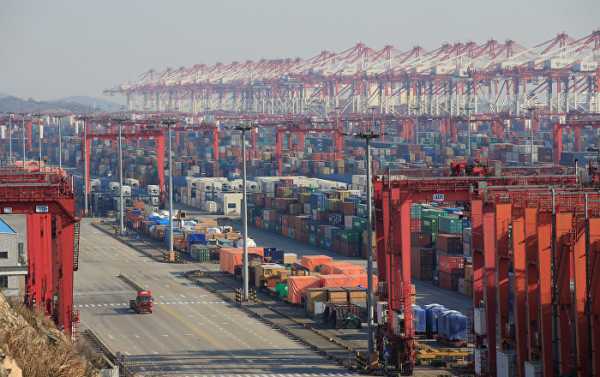
Thousands of Chinese retailers and distributors have signed multiple deals with western manufacturers to boost the import of goods into China’s domestic market, which is gradually opening up in line with Beijing’s push for deeper trade cooperation with the rest of world.
Kristian Rouz — A new report claims China’s recent International Import Expo (CIIE) has resulted in $57.8 billion worth of contracts for the nation’s major companies. These results come in line with Beijing’s push to increase the country’s imports, and balance out its staggering trade surplus in order to make trade relations more appealing to China’s international partners.
The CIIE took place between 5-10 November, bringing spectators, investors, and trade representatives from the world’s major enterprises together. During the exposition, international manufacturers and over 400,000 Chinese retailers and distributors concluded a host of business agreements to advance the import of foreign goods into China.
The impressive outcome of the show comes as China is seeking to open up its market to foreign companies in order to ensure a greater influx of hard currencies, technology, and know-how into its slowing economy.
The CIIE was put on “to increase China’s prestige as a market, as a global leader in international commerce,” Craig Allen of the US-China Business Council said. “I think it probably has been pretty successful at that.”
The Chinese authorities are also expecting an influx of foreign direct investment as a result of the concluded deals, because foreign companies are expected to be more inclined to boost their presence in China once their goods get a greater share in the mainland’s huge consumer market.
According to the China Daily, the majority of deals (worth roughly $16.46 billion) were concluded in the hi-tech and intelligence sectors, boosting the economic cooperation between China and the rest of world in these critical areas of growth.
Additionally, contracts in consumer electronics and home appliances amounted to $4.33 billion, while deals concluded in the automotive sector were worth $11.99 billion.
China also agreed to purchase some $12.68 billion worth of food and agricultural products, while deals on consumer goods such as clothing came in at $3.37 billion.
These agreements come as China appears to be caught in the crossfire of global trade tensions, stemming from the Trump administration’s decision to restrict China’s access to US technology.
Meanwhile, the recent exchange in 10-25-per cent trade tariffs between the US and China is expected to drive up prices on agricultural goods — such as soybeans — in China’s domestic market, pushing Beijing to seek alternative routes of food supplies.
Experts say international companies are keeping a close eye on China’s ongoing economic reforms, which could potentially allow for a greater mutual trust between Beijing and overseas investors.
“A trade show is probably not particularly relevant,” Allen said. “The real test is whether or not the policy measures articulated by President Xi will be implemented in the near term”.
For his part, Chinese President Xi Jinping has vowed to further open up China’s economy to foreign investment and to allow international companies greater access to the domestic Chinese market.
Xi reiterated his commitment to free international trade, saying he would bring down imports tariffs and boost China’s imports — seeking to demonstrate what the Chinese officials have touted as ‘good will’ in Beijing’s approach to foreign trade.
“If China really will continue to open up, we would have expected additional and specific commitments to have been announced by President Xi,” Carlo D’Andrea of the European Union Chamber of Commerce in China said.
However, some western officials and experts are sceptical of China’s actions. They say Beijing is interested in new sources of technological growth and alternative sources of goods critical to its food security and the sustainability of the country’s manufacturing sector.
In addition, experts say, China is hardly expected to abandon what is deemed by the Trump administration as malicious trade practices and forced technology acquisition.
However, Chinese officials and business leaders reiterated their good intentions during and in the aftermath of the show, saying they are only interested in maintaining ‘business as usual’ ties aimed at satisfying the growing consumer demand on China’s domestic market.
“During the past two days, many purchasing delegations expressed their positive intentions, further indicating the huge demand of the market,” Richard Hausmann of Swedish medical equipment manufacturer Elekta said.
Some experts have also expressed doubt whether the massive trade show was a necessity — suggesting the majority of the announced deals would have happened anyway. However, Beijing is seeking to restore its international prestige after US trade investigations under its Section 232 and 301 alleged China has repeatedly violated the rules of international trade.
Meanwhile, Beijing is preparing further measures to deepen its trade relations with the West. During this past CIIE, Chinese officials touted next year’s events — which they said will be far greater in scale and in terms of the contracts to be signed.
For his part, President XI said China would import $30 trillion worth of goods and $10 trillion worth of services over the coming 15 years. It remains to be seen what comes out of Beijing’s statements.
Sourse: sputniknews.com






